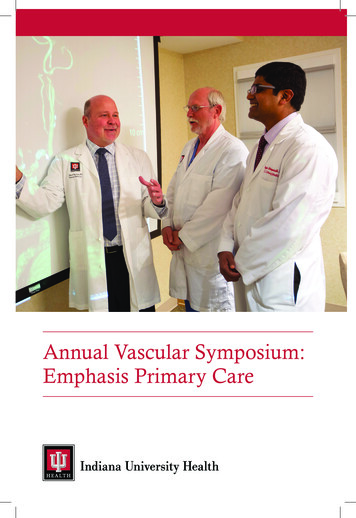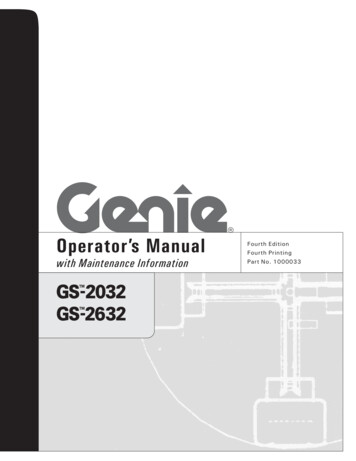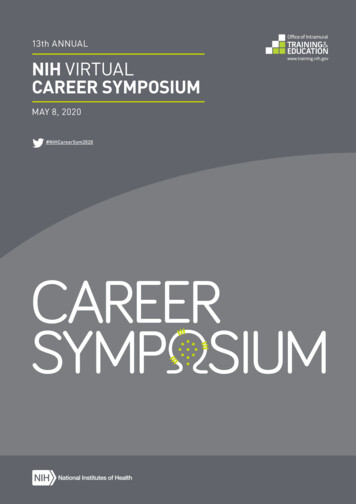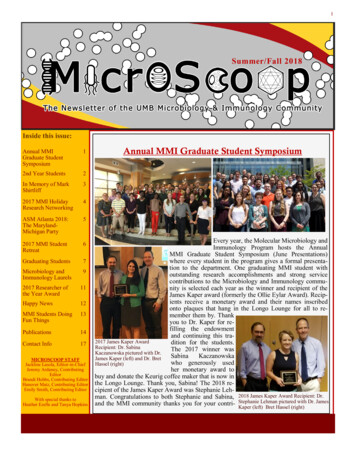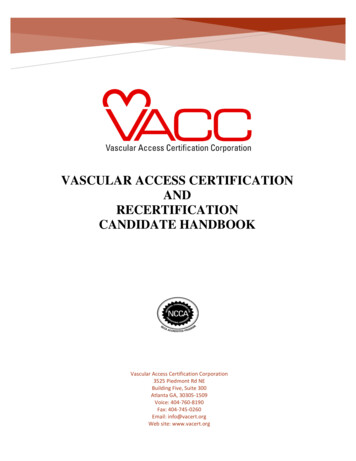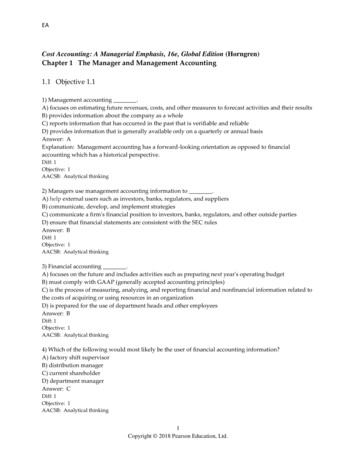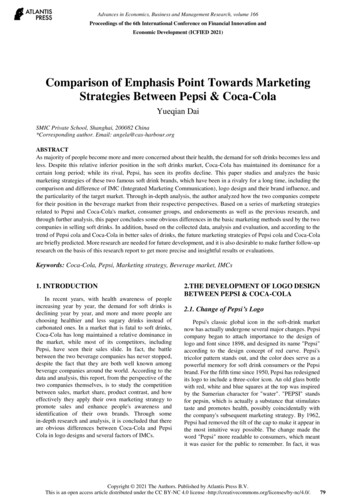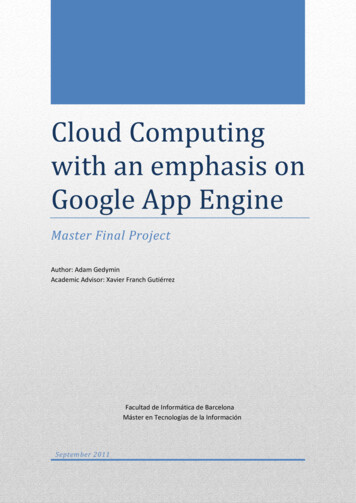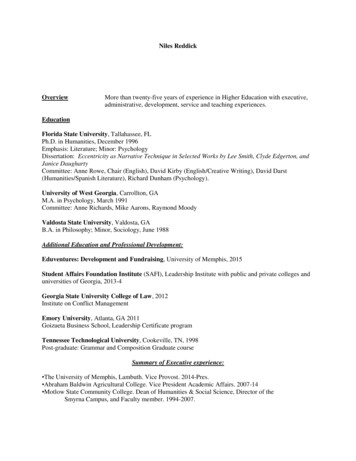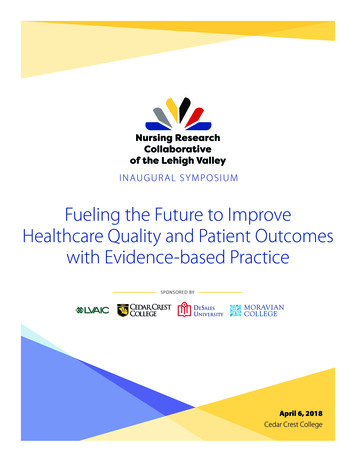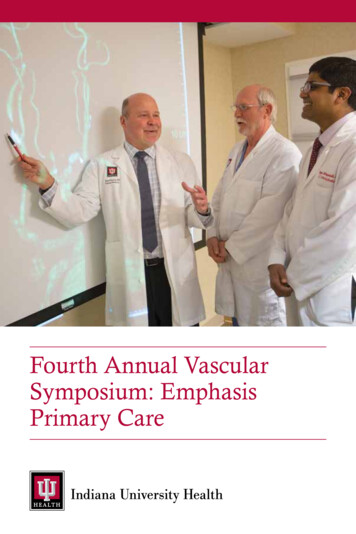
Transcription
Fourth Annual VascularSymposium: EmphasisPrimary Care
Friday, April 272018Table of ContentsCourse Description.1Course Objectives.2Accreditation Statement, Designation Statement,Faculty Disclosure Statement, Location.3Agenda. 4 – 6Chair/Champions, Contact Information .7Registration Form.8
Annual Vascular Symposium:Emphasis Primary CareCourse DescriptionThe program is a multidisciplinary approach to vascular care and treatment. Based on surveycomments from last year’s program, we have noted the topic suggestions and engaged thosespecialists in this year’s program to reflect those suggestions.The purpose of this symposium is to develop a platform to provide ongoing educationalopportunities and the potential for consultation by experts in the field. The overarching goal ofthe symposium is to improve the quality of initial and consultative care provided to patients withvascular disease, both arterial and venous, that will enhance their quality of life and in somecases, preserve life and limb. This symposium will enable us to disseminate knowledge regardingadvancements in the care of patients with acute and chronic venous disease; limb threateningischemia; podiatric care of the diabetic foot; abdominal aortic aneurysmal disease; renal failurewith focus on dialysis access and maintenance; and discussion of MACRA with overview on whatyou should know.We believe that we must address aspects of care which are integral to the primary care ofafflicted patients whether that care be provided by physician, podiatrist, pharmacist, PA/NP, nurseor wound care specialist. Some topics of interest will include: how and when to use the new oralanticoagulants in the acute and chronic care of deep venous thrombosis (including the pregnantpatient); when to screen for abdominal aortic aneurysm and new avenues of interventional carewhich might be unfamiliar to some care providers; next best steps in care and tips on caring forthe dialysis patient (medical and surgical). When available, evidence-based guidelines form thebasis for up-to-date standards of best care.The aim is to provide the primary care provider with the tools to best treat in a venue thatallows open discussion (panel discussion) and access to the experts with whom they maywant to consult in the future. A list of the speakers with contact information will be providedfor later communications. A memory stick will contain the presentation slides and other pertinentinformation. We look forward to an exciting interchange and robust discussion of factors that mayaid in implementing the topics discussed and in those factors which may inhibit such care.1
Encouraging next steps invenous disease careCourse ObjectivesAt the conclusion of the program and based on current practice guidelines:nnnnn The participant will utilize best practice societal guidelines to direct the treatment of DVT inpatients and in particular cancer patients. The participant will use clinical measures to discern those patients with pulmonary embolismwho can be safely treated outpatient with systemic anticoagulation and those who requireinpatient treatment. Patients with pulmonary embolism and findings of shock or rightventricular strain with large clot burden need consideration of thrombolytic therapy basedon societal practice guidelines. The participant will recognize that active, healthy patients with claudication requireclassification by life-style limitations with conservative treatment in place of interventionaltreatment as based on societal practice guidelines. The participant will recognize that multiple societal guidelines suggest best medical therapiesfor renal stenosis rather than intervention with the exception for unusual circumstances and willbe able to differentiate appropriate intervention. The participant will recognize that that National Kidney Disease Outcome Quality Initiative(KDOQI) recommendations in regard to renal failure have changed and will be able todifferentiate the appropriate intervention based on societal practice guidelines.2
Accreditation Statement The Indiana University School of Medicine is accredited by the Accreditation Council forContinuing Medical Education to provide continuing medical education for physicians.Designation StatementThe Indiana University School of Medicine designates this live activity for a maximum of 7.25AMA PRA Category 1 Credits . Physicians should claim only the credit commensurate with theextent of their participation in the activity.In accordance with the Accreditation Council for Continuing Medical Education (ACCME)Standards for Commercial Support, educational programs sponsored by the Indiana UniversitySchool of Medicine (IUSM) must demonstrate balance, independence, objectivity, and scientific rigor.Commercial SupportThis activity is supported by an educational grant from Cook Medical.Nursing Continuing EducationIndiana University Health is an approved provider of continuing nursing education by the OhioNurses Association, an accredited approver by the American Nurses Credentialing Center’sCommission on Accreditation. (OBN-001-91) (OH-412, 6/1/2019)Pharmacy Continuing EducationThis activity has been approved for CE credit hours for pharmacists by Indiana UniversityHealth. No partial credit will be given. IU Health is accredited by the Accreditation Councilfor Pharmacy Education as a provider of continuing pharmacy education.3
Encouraging Next Steps inVenous Disease CareFriday, April 27, 2018AGENDA7 – 8 amSIGN IN/BREAKFAST/MINGLE8 – 8:05 amMichael C. Dalsing, MD, Vascular SurgeryWelcome introduction/purpose and goals of thiseducational symposium8:05 – 8:10 amGreetings from IU Health, Ryan Nagy, MD:Best care, patient centeredEMPHASIS – VENOUS DISEASE:Moderator Dr. Michael Dalsing8:10 – 8:30 amDaniel Belcher, MD, Internal Medicine:Anticoagulants & the Elderly: Real Life PerspectiveTopics covered: anticoagulants, cost, consideration for compliance8:30 – 8:50 amSherrine Ibrahim, MD, Maternal Fetal Specialist:DVT in PregnancyTopics covered: diagnosis, treatment before and after delivery8:50 – 9:10 amNaveen Manchandra, MD: VTE Special CasesTopics covered: prophylaxis (long trips), Rx in cancer/HIT/upperextremity DVT/SVT9:10 – 9:30 amJeff Kline, MD, Emergency Medicine: Treating acute VTE asan outpatientTopics covered: role of thrombolysis, risks, benefit, how long, howto stop, recurrence surveillance9:30 – 9:40 amPANEL DISCUSSIONQuestions from audience and audience response9:40 – 10 amBreakEMPHASIS – PERIPHERAL ARTERIAL DISEASE (PAD) LOWEREXTREMITY: Moderator Dr. Dan Belcher4
10 – 10:20 amMichael Dalsing, MD, Vascular Surgery: PAD: Beware theocular-stenotic reflexTopics covered: prevalence, presentation, non-invasive diagnostics,best medical treatment, indications are symptom significancedriven, difference between claudication (non-significant &significant) and limb threatening ischemia, diagnostic (CTA versesangiogram) and best time to refer10:20 – 10:40 amRaghu Motaganahalli, MD, Vascular Surgery:PAD: Percutaneous interventionsTopics covered: best candidates, options, expected resultsincluding complications10:40 – 11 amAlok Gupta, MD, Vascular Surgery: PAD: Open surgeryTopics covered: best candidates, options, expected resultsincluding complications11 – 11:20 amMichael Murphy, MD, Vascular Surgery: PAD: Horizons inPAD treatmentTopics covered: clinical trials, experimental protocols available foryour patients11:20 – 11:40 pmPANEL DISCUSSIONQuestions from audience and audience responseNoon – 1 pmLUNCHEMPHASIS – RENAL FAILURE AND DIALYSIS:Moderator Dr. Jeff Kons1 – 1:20 pmAlan Sawchuk, MD, Vascular Surgery: Renal Artery RevascularizationTopic covered: who to evaluate and consider treating – the data1:20 – 1:50 pmJonathan Bazeley, MD, Nephrology: Renal insufficiency/failure:primary careTopic covered: who and when to refer for optimal prevention andearly care of renal failure1:50 – 2:20 pmGary Lemmon, MD, Vascular Surgery: The Dialysis Patient: AccessTopics covered: dialysis access options, how to care for dialysisaccess. What if it does not mature? When can I use it?5
AGENDA continued2:20 – 2:40 pmPANEL DISCUSSIONQuestions from audience and audience response2:40 – 3 pmBreakEMPHASIS – POTPOURRI OF SPECIAL EMPHASIS:Moderator Dr. Gary Lemmon3 – 3:20 pmTarick Abdo, DPM: Podiatric Care of the Diabetic FootTopics covered: important physical findings and diagnostics,off-loading and other preventive treatments3:20 – 3:40 pmSahand Rahnama-Moghadam, MD, MS: Dermatologic Vasculitispertinent to the Primary Care ProviderTopics covered: indications for referral, morphology of vasculitis,common mimics of vasculitis, toxicities of selected drugs intreating vasculitis, how to share the responsibilities for best care3:20 – 4 pmAndres Fajardo, MD, Vascular Surgery: Endovascular Repairs forAortic Aneurysmal DiseaseTopics covered: What is it? Indication (EVAR, FEVAR) andoutcomes. When might open repair be better?EMPHASIS – THE QUALITY ERA: Moderator Dr. Tarick Abdo4 – 4:20 pmMichael Dalsing, MD, Vascular Surgery: MACRA: An Overview(MIPS and APM)Topics covered: What is MACRA, difference between MIPS andAPM, things you should know about each4:20 – 4:40 pmJeff Kons, MD: MACRA: Advancing Care Information (EMR) andHow to WinTopics covered: vascular specifics for initial evaluation, follow-up,risk factor consideration, optimal documentation of care in theEMR System64:40 – 5 pmPANEL DISCUSSIONQuestions from audience and audience response5 – 5:05 pmDr. Michael Dalsing: Closing Comments and Thank You, contactinformation for the Champions and Nurse Coordinator5:15 – 6:15 pmWINE AND CHEESE, DOOR PRIZES, MEET THE FACULTY ANDOTHER ATTENDEES
CHAIRMichael C. Dalsing, MDVascular SurgeryChampionsTarick I. Abdo, DPMPodiatryGary W. Lemmon, MDVascular SurgeryJonathan W. Bazeley, MDNephrologyNaveen Manchanda, MDHematology/OncologyDaniel W. Belcher, MDInternal Medicine/Primary CareRaghu Motaganahalli, MDVascular SurgeryAndres Fajardo, MDVascular SurgeryMichael P. Murphy, MDVascular SurgeryAlok K. Gupta, MDVascular SurgeryRyan D. Nagy, MDChief Medical Officer AHCSherrine A. Ibrahim, MDOB/GYN, Maternal & Fetal SpecialistSahand Rahnama-Moghadam, MD, MSDermatologyJeffrey A. Kline, MDEmergency MedicineCynthia M. Richardson, RNProgram CoordinatorJeffrey A. Kons, MDFamily MedicineAlan P. Sawchuk, MDVascular SurgeryContact InformationCynthia Richardson, RN, BAProgram Coordinatorcrichar5@iuhealth.orgTim RoachProgram Administratortimroach@iupui.eduREGISTRAR:Indiana University School of MedicineDivision of Continuing Medical Education410 W. 10th St., HS 2100Indianapolis, IN 46202T 317.274.0104T 888.615.8013We want everyone to feel welcome at this and other CME events. If you have a disabilityand need an accommodation to participate in this program, we will try to provide it. Pleasecontact the CME office before you come to the event. At least 72 hours notice may be necessary.7
Fourth Annual VascularSymposium: EmphasisPrimary CareFriday, April 272018Register online siumAfter April 23, 2018, please register at the door.There is no registration fee for this program; however, pre-registrationis appreciated.8
Attendee feedback on2017 Symposium“This is the second year that I haveattended and have been impressedwith the event. Everything about theconference was done very well. Icannot conceive how to make itany better than it was and I lookforward to coming again next year.”Bruce Becker, NP“I had a great time at the annualsymposium last Friday. The divisionmembers are always so kind andgracious.There are great topics, greatspeakers, great information beingpassed on to us all.”Deb Kline, MSN, NP
2018 IUHealth 2/18 IUH#26850April 27, 2018Hine Hall, University Conference CenterFourth Annual VascularSymposium: EmphasisPrimary CareIndiana University School of MedicineDivision of Continuing Medical Education410 W. 10th St., HS 2100Indianapolis, IN 46202
afflicted patients whether that care be provided by physician, podiatrist, pharmacist, PA/NP, nurse or wound care specialist. Some topics of interest will include: how and when to use the new oral anticoagulants in the acute and chron
